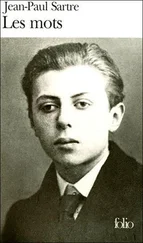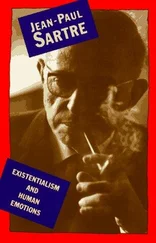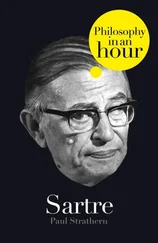Ismail’s explanation for his absences couldn’t be further from the truth. He was not going to Abnaa al-zaman every day as he had told his friend the philosopher and as was confirmed by many of al-Sadriya’s inhabitants. The journal’s editor, Salim Malkun, was not a stupid man and would never have assigned to Ismail the responsibility of replying to the Arab World’s then most famous existentialist. He could not put himself in such an embarrassing position, as he knew very well Ismail’s weak style, his inability to write without mistakes, and his obscure, ridiculous ideas. A typical passage might read as follows: “Existentialism — what is existentialism? In reality it is an existential nausea, a type of nausea that Sartre, the father of the wonderful existential nausea, taught us. He wrote the novel Nausea in one month, as confirmed by the philosopher of al-Sadriya, who saw him in person in Paris and is married to his cousin.” The article would then be filled with a series of insults against all those who criticize existentialism. The names of Shaul and One-Eyed Jaseb were usually among them.
There was no way a respectable newspaper like Abnaa alzaman could publish such rubbish. When Ismail used to read them to Abd al-Rahman in the presence of the dancer Badi‘a, in the midst of the hubbub created by the singers and drunks, the shouting of the prostitutes, the swearing, the overturned chairs, and the rushing servers, Badi‘a would pulse with admiration for this virile man. Abd al-Rahman felt the articles were missing something but was not able to pinpoint what.
Abd al-Rahman found excuses for Ismail’s repeated absences, which soon became established fact. He was the only one to believe Ismail’s excuses and accepted that he was on an existential mission. Badi‘a had her doubts when she noticed Ismail’s lack of interest in Wazzeh, one of the prostitutes. She tried to draw the philosopher’s attention to Ismail’s absences, but it was in vain. He was convinced that Ismail was on an existential mission, a great undertaking, even though it consisted of writing meaningless articles — but then again life is meaningless. As long as Ismail did not claim to be a philosopher like him, he would tolerate his absences and expect him to defend the philosopher’s den and shut up One-Eyed Jaseb, Shaul, and others.
I learned from more than one source in Mahallet al-Sadriya that Ismail paid frequent visits to the philosopher’s house during his absence. He established a relationship with his wife, whom Ismail truly believed to be Sartre’s cousin. He was convinced that as long as he could lie on the cousin of Sartre, the greatest French philosopher, it was as if he had slept with the whole of France.
18
A poor vagabond like Ismail had nothing but his virility to boast about, something that could attract a Frenchwoman who had had no sexual relations with her husband since they mutually lost their attraction to one another.
Every evening he would saunter down Mahallet Abu Dudu, go past the Christian quarter, then the convent courtyard, and finally to the Jewish quarter. He wandered into al-Sadriya in front of the roosters’ cage, listening to the calls of the fruit vendors and watching the women wrapped in their abayas and those sporting the latest hairstyles.
Shaul knew very well where Ismail went, so did One-Eyed Jaseb as he shouted praise for the apples he sold on his cart, and Hamdiya who sold her merchandise at the souk. Even Dr. Simon Bahlawan knew where Ismail Hadoub went in the morning and sometimes in the evening, leaving only a half hour before the husband’s return.
The philosopher, on the other hand, continued visiting his mistress openly each night and experiencing his usual nausea.
19
Existentialism was the philosophy of choice for Iraqi intellectuals in the sixties, which explains why the arrival of the philosopher to Mahallet al-Sadriya was considered the greatest event of that decade; his presence filled a huge philosophical gap. The intellectuals of the time could not wait forever, for the appearance of a new major philosophy or a philosophical interpretation of an existing major philosophy. They were eagerly anticipating the arrival of such a historical event and were, according to numerous sources, lost in pseudo-philosophies.
It was in this condition of confusion and loss that Abd al-Rahman, son of Mr. Shawkat and the greatest philosophical mind of his time, appeared on the scene. Without him they would not have been able to put a radical end to this complex philosophical problem. He brought them an authentic philosophy, not a false one, a unique philosophy that was not a mere copy of French existentialism, or a passive artificial interpretation, but a creative Arabic interpretation of it. This all happened thanks to Abd al-Rahman’s constructive efforts in formulating and establishing this philosophy and his pushing it onto a path that its founder, M. Jean-Paul Sartre, would never have thought possible.
20
Following a philosopher differs from following a follower of philosophy. Abd al-Rahman was a philosopher; therefore, being his follower was not like being Suhail Idris, a follower of philosophy. With such a concept it is understandable that Abd al-Rahman was able to gather a large number of followers around him in the sixties.
Abd al-Rahman’s withdrawal from upper-class society and the soirées of noble families essentially forced him to seek his public in the streets and to lower his standards in order to reach his followers. Being wealthy, handsome, young, and elegant gave him independence and power and moved him in the direction of instinctive pleasures. He was able to associate with those less fortunate than himself, such as Ismail Hadoub, and such actions provided proof of his correctness and humility. Ismail Hadoub, on the other hand, considered the matter a privilege for himself and an appreciation of his genius, which made up for his modest background. This motivated him to become intimately attached to the al-Sadriya philosopher. He spent wonderful days with him, walking behind him, carrying a notebook and a golden pen, writing down the valuable words uttered by the philosopher.
On a cold January day, as it was raining heavily in Baghdad, Ismail stood in front of a café where the philosopher was sipping coffee. He wore nothing but a woolen sweater that Shaul had given him when he was working in his store. He was shivering from the cold, and as soon as Abd al-Rahman saw him he took off his black woolen coat and placed it on Ismail’s shoulders. “You represent to me what Simone de Beauvoir represented to Sartre,” he said. The public in the café heard those words and began spreading them everywhere. It became known that the philosopher took good care of his followers. He shaped them and made sacrifices for their sake.
People were somewhat surprised by the intimate friendship between the two men. They were surprised by the existential image that conveyed truly the humanitarian side of this goodhearted existentialist, this nauseated person, this bright, energetic Sartrian who surpassed Sartre himself. Four years later Ismail Hadoub betrayed Abd al-Rahman and slept with his French wife. The scandal was known all over the country. Abd al-Rahman died, a homicide or suicide, and Sartre’s cousin returned to her country. Iraqi intellectuals everywhere declared that Sartre was embarrassed by the scandal. All that remained of Abd al-Rahman was the black coat on Ismail’s shoulders.
21
When the existential philosopher had lost his way in the metropolis of existentialism and before he had found the house he was looking for in Gay-Lussac Street, he encountered his destiny standing on the sidewalk wearing a dark red suit, a woolen coat, and a simple woolen hat. This is where he met Germaine, the woman he later married, and through her he espoused a whole nation.
Читать дальше












